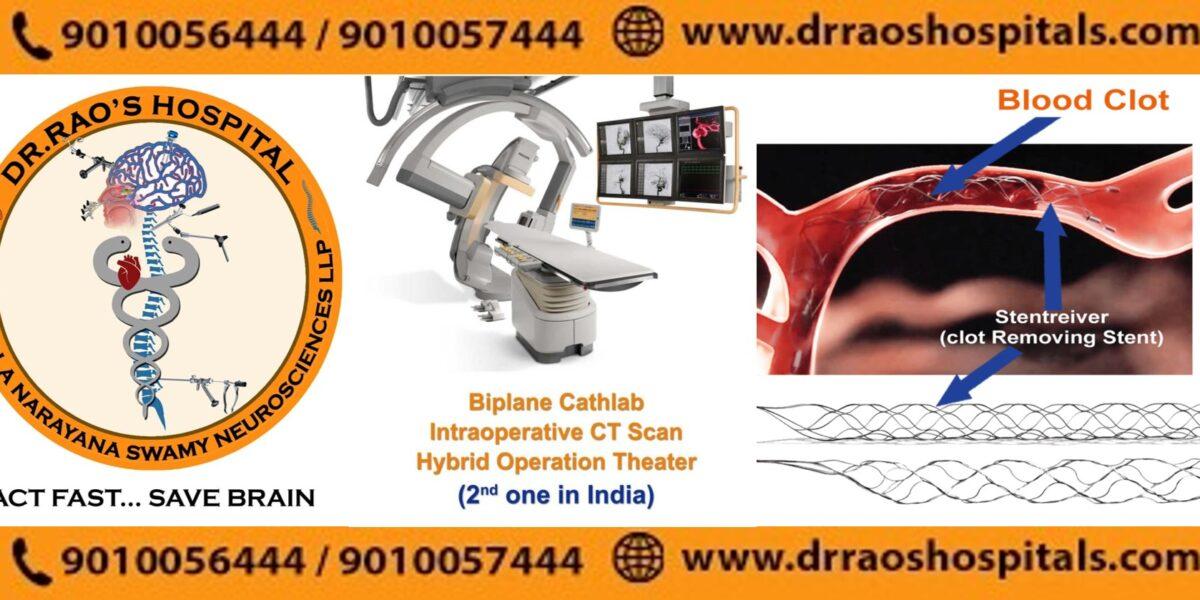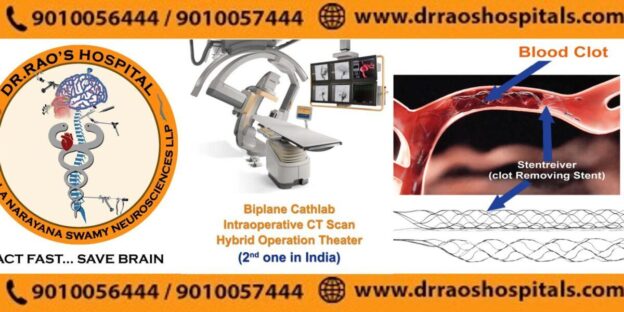The best stroke treatment is at Dr Raos hospital Guntur
What Is A Stroke?
Stroke treatment and The science and following of neurology is based on the concept that the mind works like a computer, with cells known as neurons making connections between one another and passing messages through the body. When something occurs to these neurons – it could cause your psychological talents to vary dramatically. Discover what a stroke is in this text and how it may affect your life! A stroke is the sudden development of a neurological deficit like speech problem, arm or leg weakness, balance issues, eye vision loss, or facial droop due to disruption of blood supply or rupture of the blood vessel.
What are the Causes of a Stroke
A stroke is a complicated medical situation through which blood movement to the mind is blocked or interrupted. There are several types of strokes, and they can affect any part of the mind. The most familiar trigger of a stroke is a blood clot with in the arteries leading to the brain. Other causes are aneurysms, swelling of the artery wall, and a bleeding disorder referred to as hemophilia. It would be best if you searched for medical attention instantly for those who recognize signs such as sudden confusion, difficulty talking, difficulty swallowing, numbness or tingling on one side of the body, or seizures.
Symptoms of a Stroke
A stroke treatment is an emergency that can damage the brain and cause severe problems, such as paralysis or loss of life. The signs of a stroke can range depending on the affected part of the brain. Some widespread symptoms of a stroke embrace: – numbness or weakness in some limbs, particularly on one aspect of the body – trouble speaking or understanding speech – problem walking, making decisions, or feeling conscious of your surroundings – sudden confusion or issues with vision
Clinical Presentation of a Stroke
A stroke is a neurological disorder that may damage the blood vessels within the mind. It’s the fourth leading trigger of demise within the United States. A stroke can occur when blood flow to the brain is obstructed or reduced. Symptoms of a stroke include sudden severe numbness or weakness on one side of the physique, speaking issues, confusion, and lack of coordination. A stroke can lead to permanent disability and even demise if not handled shortly. There are many things you can do to help prevent a stroke:
- Get common exercise.
- Eat a healthy weight loss plan.
- Cut back your risk factors for heart illness and diabetes.
- Get vaccinated against HPV (human papillomavirus).
How can we diagnose a stroke?
A stroke treatment is a medical emergency that may happen when the bloodstream to the brain is blocked or impaired. A stroke may cause critical issues, including paralysis and loss of life. There are numerous types of strokes. However, all of them share some frequent signs. For those who assume you will have had a stroke, do not wait to call 104 or 9010056444/9010057444. Immediately call Dr Rao or Dr Raos hospital and inform them what happened. They give you directions on tips on how to get to the hospital. If you cannot speak, write down what happened and provide it to someone else who can aid you in remembering. The signs and signs of a stroke depends on the part of the brain that’s affected. However, some typical indicators that something is unsuitable along with your brain embrace: sudden weakness or numbness in a single aspect of your body; bother talking or understanding phrases; sudden confusion; loss of steadiness and coordination; headache; nausea or vomiting; fast or irregular heartbeat; seizure (convulsion).
Stroke, Coma, and Seizure
A stroke is a severe medical condition that can harm your mind and lead to long-term disability. A stroke occurs when blood flow to your brain is blocked or lower. There are two predominant strokes: ischemic (resulting from a blockage within the arteries) and hemorrhagic (attributable to an excessive launch of blood). Symptoms of a stroke can range. However, they often include sudden numbness or weakness on one side of the body, issues talking or understanding what individuals are saying, bother strolling, confusion, and severe headache. Please go to the hospital instantly for those who are experts in any of those signs. If in case you have a stroke, it’s vital to get treatment as quickly as potential. Treatment includes utilizing units known as defibrillators to shock your coronary heart into beating once more if it fails and providing supportive care akin to oxygen and IV fluids. Depending on the severity of the stroke, many individuals require specialized care in a hospital setting for several weeks or even months. According to mid-day
Treatment for a Stroke
A stroke treatment is a problematic situation that impacts the mind and can result in paralysis or death. A stroke occurs when blood flow to the brain is blocked. There are a lot of various kinds of strokes, but all share some widespread signs. The first signal of a stroke is a sudden feeling of weakness or numbness in a single side of the body. Other indicators might include difficulty talking, problems understanding what individuals are saying, hassle walking, and issues with vision or coordination. For those who assume you could have had a stroke, you should call 104/9010056444 or 9010057444 immediately. If you have a stroke, the smartest thing to do is to remain as still as possible and chill out your muscles. You will probably be hospitalized for treatment and want care from docs and nurses throughout your keep. Treatment for a stroke could embody medicine IV tPA to help enhance blood flow to the brain, surgical procedures to remove blockages in blood vessels, mechanical thrombectomy to rescue the brain, or both.
Conclusion
A stroke treatment is a critical medical situation that may cause paralysis or death. If you’re ever concerned about whether or not you might need a stroke, search for assistance from a doctor. In the meantime, here is some information on what strokes look like and how to acknowledge the signs. Finally, make sure you contact your beloved ones and allow them to know what is happening to allow them to present support throughout this challenging time. Looing for the best stroke comprehensive care in Guntur or Andhra Pradesh, look no further than Dr Raos hospital, the best interventional neurology biplane Cath lab hospital, reach us @9010056444 or 9010057444.


